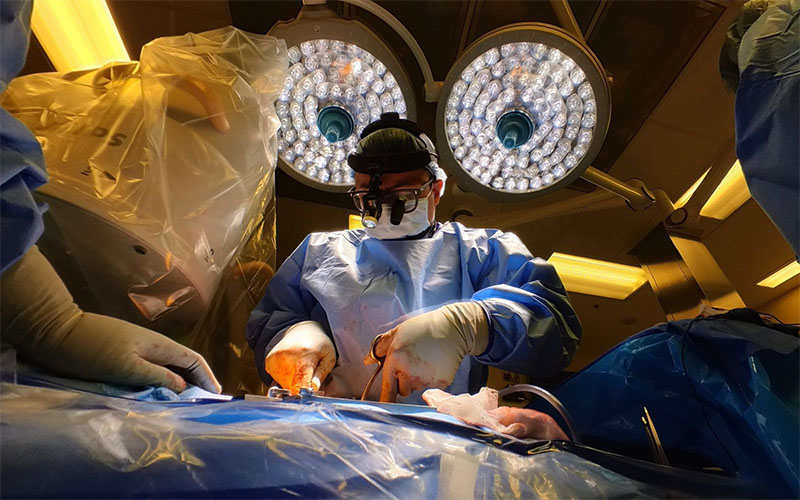
August is Neurosurgery Awareness Month. Here are some common questions and answers about neurosurgery at Valley’s Neuroscience Institute.
What is Neurosurgery?
Neurosurgery is a medical specialty that focuses on diagnosing and treating conditions of the brain, spinal cord, and nerves. Patients include both adults and children. Surgeries can involve making large incisions (openings) in the skull, while others use small incisions and catheters (small tubes to remove fluid or deliver medicine).
You may need neurosurgery for:
- Tumor removal
- Aneurysm repair to prevent strokes
- Epilepsy treatment
- Pressure relief
- Brain anatomy correction
- Device implants
Who is on a Neurosurgery Team?
Neurosurgery teams include professionals who work together to ensure high-quality care for patients. Often these include:
- Neurosurgeons are physicians who perform surgery and oversee treatment.
- Anesthesiologists are physicians who manage pain and sedation while also watching breathing and other vital signs.
- Nurses who assist the neurosurgeon and care for patients.
- Surgical Technologists who prepare equipment.
- Physician Assistants who assist the surgeon.
- Office staff who manage clinic operations.
Neurosurgeons will frequently work closely with other specialists like neurologists, radiologists, oncologists, and rehabilitation therapists.
How are Neurosurgeons Trained?
Becoming a neurosurgeon requires extensive training: four years of college, four years of medical school, and seven years of residency. During this training, neurosurgeons learn about nervous system anatomy, diagnosing neurological diseases, surgical techniques, and preventing complications. They gain experience in specialties like vascular, tumor, spine, functional, pediatric, trauma, and endovascular neurosurgery. Some may seek additional training or research. Neurosurgeons stay updated on new treatments and technologies with continued education.
What is Recovery Like After Neurosurgery?
Recovery continues after leaving the hospital and will depend on the surgery and patient goals. This phase involves rest, gradual activity, and rehabilitation. Patients work on getting back their mobility, managing pain, and coping with changes. Other treatments patients may use during recovery include physical therapy, occupational therapy, and speech therapy.
What Advanced Technologies Does Valley Use?
The neurosurgery teams at Valley Medical Center use the most up-to-date surgical methods, imaging, and equipment to improve the outcomes and safety of every patient, including:
- Neuronavigation which guides surgeons using images to plan surgeries.
- Stereotactic radiosurgery which precisely targets areas with radiation.
- Endoscopic brain surgery which is a minimally invasive (surgery with a smaller incision) technique using a thin tube and camera.
- Functional intraoperative mapping which assists locating brain areas during surgery.
- Neuromonitoring which monitors nerve function during surgery.
How Do I Schedule an Appointment?
We are here to provide compassionate care for your neurological needs.
To schedule an appointment with a neurosurgeon, call 425.690.3586. You may need a referral from your primary care provider or specialist. Visit our Neuroscience Institute website for more information.
The Neuroscience Institute at Valley Medical Center provides regional, pioneering care in the field of neuroscience, encompassing a vast array of neurological specialties. The Institute’s neurosurgeons, orthopedic surgeons, neurologists, stroke and epilepsy specialists, technicians, and neuropsychologists bring decades of nationally renowned study and practice to this education and treatment center.
This article was written with the assistance of GPT-4, an AI language model from OpenAI. GPT-4 was used to generate the initial draft of the article, and it was then reviewed and edited by Ryan Salinas, MD, Valley Neurosurgery Clinic.


The information was very useful and reassuring to learn about the entire team supporting the surgeon.
Thank you for reading our blog!
Dr. Peter Balousek is my Neurosurgeon and I appreciate him more than he knows. To be corny, he had my brain and life in his hands. He’s thorough, explains details and you can see how much he loves what he does. I would recommend him every time.
Thank you for the nice comment. We will pass along to Dr. Balousek.
Hello, I would like to be scheduled with a neurosurgeon.
Thank you for reading our blog. You can call 425.690.3586 to request an appointment. Please note that some insurance plans require a referral before an appointment.